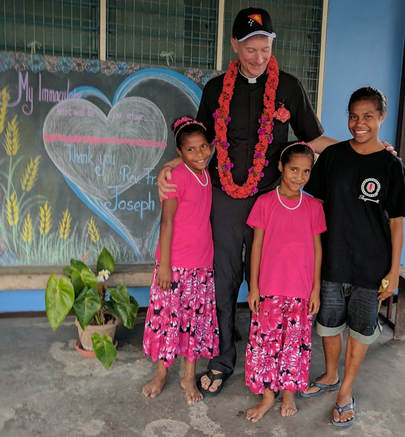 Three of the orphans at the sisters' convent after our retreat on Friday. Three of the orphans at the sisters' convent after our retreat on Friday. Papua New Guinea St. Paul tells us in the epistle that we are children of God. How easily we forget, in our complex and technological society, that we are children of an all-provident Father. We have grown used to the illusion of self-sufficiency, depending on technology and government and the works of our hands to meet our needs. The last two weeks I’ve been in the Island kingdom of Papua New Guinea, giving a retreat to the Missionaries of Charity sisters. They have 17 stations, many accessible only by small boats and trails in the bush. It’s refreshing to spend a week or two with people who are closer to the earth. Funny thing: the closer you are to the earth the more clearly you can see heaven. “The spirit we have received bears witness with our spirit that we are children of God and heirs to the kingdom,” writes St. Paul. The Spirit of God inspires in us a thirst for a simple, God-fearing life. I was delighted to find the people of the bush so friendly. Everyone you pass says hello with a big smile, usually red from chewing betelnut. How much faith they have in God’s providence and the universal brotherhood of man! Yesterday the sisters and I drove to a rural stretch of seacoast for a picnic. The road ended at a weather-beaten farm house, where an old man and his wife were spading the rich black soil to plant potatoes. It seemed like we had come upon Abraham and Sarah, at peace with themselves and the world. “Good mother,” Thomas (our driver) called out, “can we swim at your beach?” She smiled, put down her hoe, and took us down a path to the ocean. Then she returned the potato patch and her husband, who waved at us with a broad smile. They were delighted to have a visit from strangers, fellow servants of God. Thomas and I swam in the blue coral waters while the sisters walked along the shore, and their grandchildren joined us. Stewardship Our divine Lord uses the word “steward” in today’s Gospel. Like that dear elderly couple in Papua New Guinea, a steward understands that the goods he manages are not his own. The earth, the sea, the air: all from God. He gives us everything not to squander, but to cultivate. Abraham and Sarah, if you remember their story in Genesis, followed the Lord’s call to emigrate from Ur of the Chaldees to the Jordan valley, making the desert bloom by their hard work and grateful praise. When three men came upon their camp, Abraham and Sarah offered warm hospitality to this “Old Testament Trinity.” You never know when you will receive angels into your home, so grow your gardens, and tend your souls, with loving care. We are stewards, now owners. Many of our neighbors in post-Christian America unthinkingly live as if they owned their bodies and all that they have been given. Their bodies end up owning them, “debtors to the flesh” in Paul’s words. Our Bodies Planned Parenthood wants to build a flagship abortion clinic on Bush at Van Ness. It will be a statement. Some of us went down to protest, and a counter protester stood shouting “my body my choice.” Even the poor farmers in New Guinea know that is not true. First, the unborn child is a genetically distinct individual. And second, no one owns his or her own body. We are stewards, not owners, of the mysteries of God. The human body is a gift and a mystery. We did not make our bodies and they will be taken from us one day. All around us people squander their bodies and souls, as if they were theirs to waste. Life is so much better if we humbly acknowledge the gift, and the Giver. Why not happily tend our little potato patches for the glory and honor of God? Let me recommend one way of tending your potato patch. Our Lady The sisters’ retreat in New Guinea was on Our Lady of Fatima. After showing the three shepherd children a vision of hell in July 1917, she said: “You have seen hell, where the souls of poor sinners go. To save them, God wishes to establish in the world devotion to my Immaculate Heart. If what I say to you is done, many souls will be saved and there will be peace.” We practice devotion the Immaculate Heart by cultivating purity in our own hearts. Let us pray to God for hearts so pure, so beautiful. Pray the rosary daily, and you will become what you pray. Mary Immaculate, Our Lady of Fatima, pray for us! 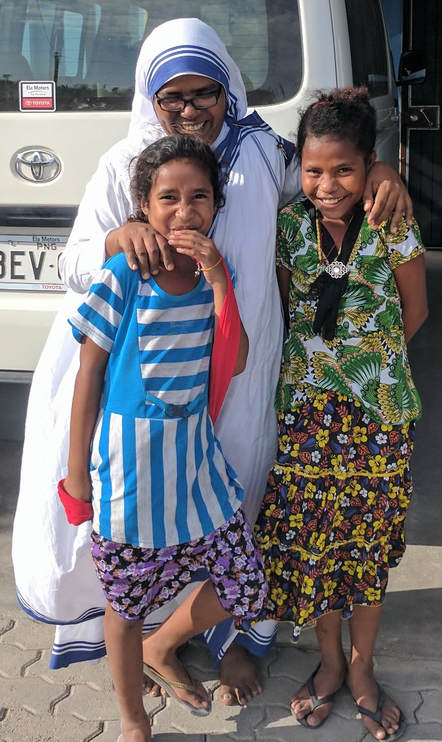 Sister Superior (Sr. Ando Therese, MC) with two of their orphans, Aysha and Selina Sister Superior (Sr. Ando Therese, MC) with two of their orphans, Aysha and Selina “Connectivity” we cannot live without. By that word the internet industry means online access, and I must confess that one of the first questions I asked the sister superior upon arriving at Papua New Guinea was “how can I get internet access?” Even in the remotest mission houses, the sisters seem to know how to obtain connectivity for their retreat directors, so I guess every priest asks the same thing upon arrival. Here on my South Pacific Island, though, I’ve found another kind of connectivity. It is far more fundamental to the human species than online access. Here in the islands, it seems, people connect to each other even without the internet. This morning I went for a walk, and every single person I passed greeted me with a smile and “hallo!” I am not used to such connectivity! Unlike urban America, I don’t have to lower my eyes when approaching a passerby, or stare at my cellphone, or protect myself with earbuds. I was free to look at, and to connect with, perfect strangers! I guess I’m experiencing the universal brotherhood of the Islands. Something in the warm ocean breezes thaws human hearts. I reached the top of the hill, saluted the mighty Pacific, and started back down again. I came upon a little boy playing outside his shanty, and we greeted each other joyfully. He ran ahead of me, shouting to the next house “white man comin’! white man comin’!” The word ran down the line, and people came out of their dwellings to greet a stranger. Connectivity runs like an electric current through the villages. I thank God (along with the inventors of the world wide web) that I was able to get online here in Port Moresby. I wouldn’t be sending you these musings from the South Pacific without it, or be able to communicate (at least virtually) with my parish in California. We’ve gained a marvelous electronic connectivity to the world, but we must also realize that we’ve lost an essential human connectivity to the guy next door. In fact, this loss of connection with even the people we live with (think of talking to your teenager while she’s texting someone in Australia) is killing us. Yesterday I read an arresting article about the suicide epidemic. “Death by despair” is now the second leading cause of mortality among adolescents and young adults in the United States. The author, an associate professor of psychiatry at UC Irvine, mentions a young man who jumped off the Golden Gate Bridge a few years ago. His last diary entry was “I’m going to walk to the bridge. If one person smiles at me on the way, I will not jump.” I hear this loneliness and disconnection all the time in the confessional and spiritual direction. I feel it myself. The pervasive loneliness of our time is quite literally lethal. Here in Port Moresby, everyone smiled at me on the street this morning. I felt about as far from lonely as I have been in a long time. Don’t let the big companies tell you that “connectivity” requires an internet access point. What makes life worth living is connectivity with people we pass on the street, not “friends” on Facebook. Perhaps many people in Papua New Guinea have Facebook accounts, but they don’t depend on them, at least not yet. They have each other, and they look at each other. I want to take a bit of this connectivity back to San Francisco with me. 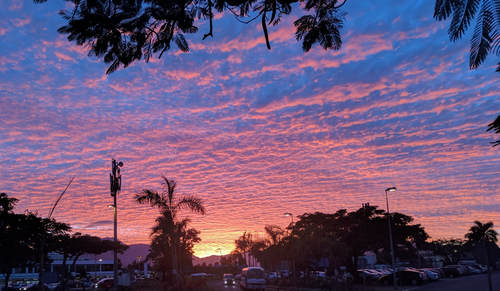 Sun rising over Papua New Guinea's airport Sun rising over Papua New Guinea's airport Here in Papua New Guinea the people are exceedingly friendly. They are poor (the going wage is 15 cents an hour) and natural (they live off the land mostly, have lots of children, and delight in both). They sit about a lot, talking with each other and just looking at the trees, the birds, the sea, and the weather. In this way they are more contemplative, more receptive to reality, than their “busy” cousins from America and Europe. I went hiking yesterday with three youths and found it hard to adjust to their loping gait. I wanted to race up the mountain and get back, both to set a personal best and to get back “to work” on my computer. But after an hour of carefully placing one foot in front of the other, with the luxury of casual conversation and looking about, I found the measured pace quite natural. Because the locals here take lots of time to look and listen to the world around them, they are naturally religious. They wouldn’t think of denying the existence of a heavenly Father, nor would they think of taking his manifest gifts for granted. They thank God in childlike praise within their many houses of worship. Like the island breezes that blow through my open windows all day, like the many-colored birds that chorus riotously in the early morning, their simple faith daily refreshes the soul. 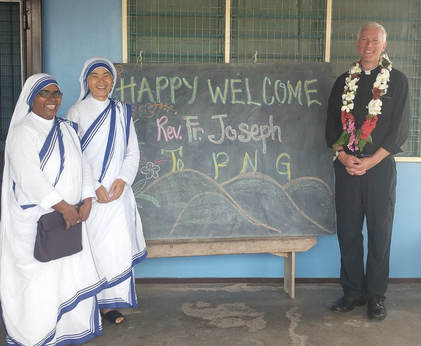 The sisters welcome me to PNG (Papua New Guinea) The sisters welcome me to PNG (Papua New Guinea) But there is trouble in paradise. Dogfights. Hundreds of dogs lounge around the dusty streets, many ownerless, almost all of them skinny fleebuckets. They incessantly bark and bite at each other, especially between midnight and 5am. As all of us sleep with windows wide open, we get a front row seat at the fights. Last night I woke many times to the hellish din of howls, shrieks, screams, and scuffles among these mangy mutts. “Why can’t you all find something better to do than barking all night?” I complained before reinserting my earplugs and turning over. Don’t get me wrong: some of my best friends are dogs. But dogs are not that smart, and they need help to focus their lives beyond fighting all night and sleeping all day. I remember working one summer in a packing plant. All but one of my eight-man crew were high school dropouts, and one day “Skinny,” one of the dropouts, summed up his life as the “three F’s”—feasting, fighting, and one other F that I won’t mention. Some of these men I considered friends, at least for a summer, but I wondered why they didn’t expect more from life than a kind of doggy existence, such as I see in the down-to-earth locals here in Papua New Guinea. I hope they eventually got married and got beyond the self-absorbed level. But not likely, because marriage and family are disparaged these days. The one hope for us mangy mutts to elevate ourselves to has been pooh-pooed by society. O how I miss the days when marriage and family life were prized! It hardly exists in my urban parish. As sophisticated as we appear, our lives are not much more than the “three F’s,” for without marriage and family we are just dogs in paradise.  All fifteen children of the Frey and Netniss families just before the baptism All fifteen children of the Frey and Netniss families just before the baptism The day before yesterday two families visited me from the Central Valley, “country cousins” so to speak from a former parish. Between them they had fifteen children, the oldest of which just turned 16, and the youngest of which just turned one month. They came to San Francisco to have the newest baby baptized in our beautiful church. After the baptism we went to Giorgio’s. You can imagine a pizza party with fifteen children, four parents, and a priest. People smiled at us; their faces lit up to see such a gaggle, full of joyful but disciplined energy. One of the mothers waved her hand over the long table and said “look Father—all your children!” Fifteen years ago I served as unwitting matchmaker for her and her husband. He took one look at her during a wedding I was doing and said to me “Father, get a seat beside that young lady at the reception.” I did, and she promptly ignored him for the next few months, testing his faith and his love. He passed the test, and now they have six children. “But really,” I said, “my children?” “Yes, yours Father, because you were the one who told us all to have lots of children.” I do remember saying that, but I was only quoting Scott Hahn. Of course, he was only quoting John Paul II. “It hasn’t been easy,” she was quick to add. “We didn’t believe you at first, and when they started coming we didn’t think we could keep going. Having a large family costs a great deal, but we wouldn’t trade the blessing of a large family for anything in this world.” That was Thursday. Saturday I joined a group of people praying in front of an old automotive repair shop downtown. Planned Parenthood wants to turn it into their flagship abortion facility in Northern California. We held up signs as we prayed: “Abortion Kills Children.” Some were supportive, but most expressed hatred (ie, the middle finger and plenty of FU’s). To one young woman passing by, uttering imprecations, I said “please don’t kill babies.” She shot back with a toss of her head, “I’ve killed two of them. Proud of it.” We were about ten on the sidewalk, but two pro-abortion activists showed up too. One was a young man with a sign “I [heart] Planned Parenthood.” I talked to him for a few minutes. “Do you think any society that kills its own children can flourish?” He replied, “the fetus is only a mass of cells.” “But aren’t you and I only a mass of cells too?” I asked. “Yes, but we have consciousness,” he replied. “At what age,” I said “does a human being attain consciousness?” Our conversation was respectful and calm, despite the shouting from the other Planned Parenthood enthusiast. “Just my opinion,” he replied, “but I would say five years old. Up to five years old a person is not really human because it is not sufficiently self-aware.” I looked at him and dared to say, summoning patience and love, “son, do you really want to live in a world where the weaker are at the mercy of the stronger? I want to live in a world of love, not power. Is that what you want?” He looked at me steadily. “Yes, that is what I want, but I don’t believe in God.” A commotion interrupted our conversation and I went back to our group to pray a bit. Back to the two large families at the pizza parlor. After filling up with cheesy dough, we went to the beach with a few kayaks and sand toys. The children ran about, splashing, digging holes, flying kites, wrestling in the sand, jumping into the kayaks for a spin. Many passersby smiled and said what beautiful families we had. Here were fifteen rug rats plashing about in the surf, and no one could resist their charm. I sat in the sand between kayak tours and smiled softly. Yes, these are my children, but it’s simple, really. All a priest has to do is say what he has heard in the seminary and heard in his heart. Children are a blessing. They are not easy, but they are divinely beautiful. It is not pictures of dismembered babies that converts hearts. It’s pictures of living babies, children playing in the surf, jostling for a front seat in the family van, fifteen pairs of hands folded in prayer before attacking pizza platters. Beauty will save the world. 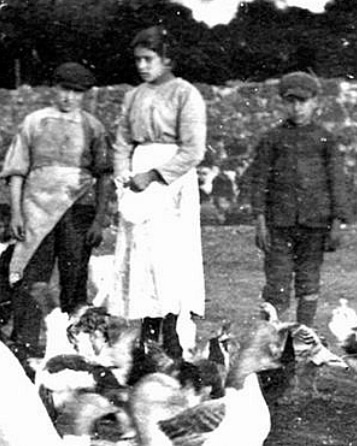 St. Maria Goretti 5 months before she was murdered. St. Maria Goretti 5 months before she was murdered. Today the Church celebrates the life and witness of St. Maria Goretti. Priests today will bear a red chasubles in testimony to her blood, which she preferred to sacrifice rather than lose her purity. This 12-year-old Italian girl, who was attacked by a young man who had himself been twisted by pornography, luminously testifies to God’s gift of the human body. She knew that her body was precious, an expression of her immortal soul. Maria Goretti truly loved her attacker by witnessing to the goodness of both their bodies. “No, Alessandro,” she cried out when he tried to bend her to his will, “it is a sin! God does not want it!” She did not want sin to kill him. He went to jail for his crime, but after 6 years (when he was ready to receive her) she handed him 14 white lilies in a dream, one for each stab wound. Alessandro's bitter heart was broken open, and he converted to God's love. After his time in prison, he often prayed with Maria's mother, who herself forgave him. Maria Goretti witnessed to purity, which is a foreign concept to most of us who live under the dictatorship of the “sexual revolution.” In fact, the imposed gender ideologies of our time have all but outlawed sexual purity. The source of all purity, and our only hope of regaining our bodily integrity, is the Body of Christ. But the Eucharist is divine. One must prepare oneself to receive so powerful a remedy, lest it’s very power harm us. If one receives the Eucharist impurely, he “eats and drinks condemnation unto himself,” as St. Paul says in 1 Corinthians 11:29. There is significant confusion in the Church today on who may or may not receive Holy Communion. Bishops have issued contradicting instructions to their priests. We hope that the supreme teaching authority of the Church will bring clarity and unity to our divided Church. It is my duty as a simple priest, however, to teach the people entrusted to my pastoral care what leads to life and what leads to death. 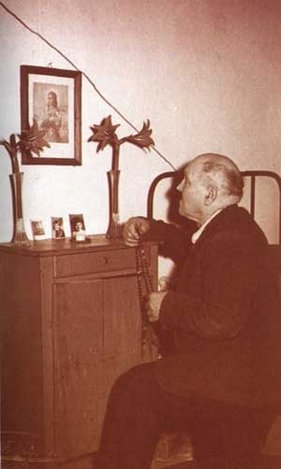 Alessandro Serenelli, St. Mariea Goretti's converted murderer Alessandro Serenelli, St. Mariea Goretti's converted murderer The Catholic Church clearly teaches that the sacraments are to be administered only to Catholics (there are some exceptions), and only to Catholics who are not engaging (especially publicly) in acts gravely contrary to the Gospel (grave sin). Sexual intercourse outside of marriage is one such gravely sinful act, and sexual acts with someone of the same sex are not only gravely sinful but also scandalously confusing. Recently, Illinois Bishop Thomas Paprocki instructed his priests to withhold Holy Communion from Catholics living in so-called “gay marriages.” He did so “given the objectively immoral nature of the relationships”. He is right. The Church’s official catechism teaches that:
Some with ecclesiastical authority, in their effort to be charitable, welcome those living in grave sin to Holy Communion. I do not question their good intentions, but we must remember, as Robert Cardinal Sarah recently wrote, that “we cannot be more compassionate or merciful than Jesus. He told the woman caught in adultery two equally important messages: ‘Neither do I condemn you;’ and ‘go, and do not sin again’ (Jn 8:11).” The Church gives us her Canon Law and Catechism as a sure guide to Christian living, that we may be happy in this life and eternally happy in the next. I ask my parishioners to look to the following for guidance (emphasis added):
The Lord Jesus himself demanded much of his disciples, such as love for one’s enemies, lifelong fidelity for one’s spouse, rejection of even lustful thoughts, and above all reception of His Body and Blood. He lost many disciples by insisting on these teachings, most notably over the doctrine of the Eucharist (John 6). As Christ would not compromise these truths, and as St. Maria Goretti would not compromise her bodily integrity, so may we today not compromise what alone can lead men and women to happiness in this life, and perfect joy in the next. 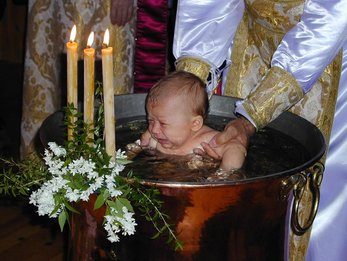 Too young to die! Too young to die! I am a Dead Man Last week I preached on hell, and this Sunday I will speak on death. Normally we talk about the “last things” in November, but last Sunday Jesus spoke of going to hell (“Gehenna”) and this week Paul gently chastises us: are you not aware, brethren, that you have been “buried with Christ?” Baptism is not, for Paul, a cute ceremony for babies with flouncy white gowns, perfumed oils, and flickering candles. Baptism is a death: “we who were baptized into Christ Jesus were baptized into his death.” These days, we can barely even pronounce the word “death.” Almost no one dares say “she died.” We have to tiptoe around the fact lest we be accused of insensitivity. We say “she passed….” Not even that she passed away, but simply “she passed.” So first of all, we have to be able to say the word “death.” And we are “dead” in two senses. First, we are dead men walking because, if we will all die in 40 or 50 or 80 years, we might as well be dead now. What will come is already here. I just marked my 26th anniversary of ordination, and those last 26 years seem to have come and gone in a blink of an eye to me. But where will I be in another 26 years? I’ll be dead, most likely. Note well that I am young compared to many of those in our parish. If you are mildly offended that I point to your age, and that you will probably die before me, we need to have this little talk about death. The world as we know it, and especially ourselves, as St. Paul says, is passing away. “Soon,” in the grand scheme of things, we will all be dead. So we might as well think of ourselves as dead already. Baptism has Killed Me But we are dead in another, far more important, sense. We are dead because “we have died in Christ through baptism,” as St. Paul writes in the second reading. The word in Greek means “immersion”—that is, drowning. Baptism’s triple immersion plunges us under the earth with Christ for the three days he lay in the tomb. Water kills, but water brings life as well. And so Paul goes on to say “we were buried with him through baptism into death, so that, just as Christ was raised form the dead we too might live in newness of life.” The old life, before baptism, is not worth living. It is really a living death to exist on this planet without God, captives of original sin. We go to work, we eat, we drink, we party, as zombies if we do all that without a greater purpose, without relationship to God, shackled to our own lusts and compulsions. So Paul says we rise from baptism not just to continue our former life but to “newness of life.” Baptism is an inoculation against real death, which we call hell: an eternity apart from God and his family of saints. How does an inoculation or vaccination work? The nurse puts a little bit of a pathogen into our bloodstream, which awakens our natural defenses to annihilate the pathogen. By tasting a little of the sickness, we overcome that sickness. In baptism we taste death, but the grace of God awakens in us to destroy that death. By this grace, sin becomes bitter to our taste, and we are freed to choose always the good, the true, and the beautiful. Baptism makes eternal life possible by giving us the capacity to refuse sin and the eternal death to which sin leads. The Sign of Death is My Life “Consequently,” Paul concludes, “you too must think of yourselves as dead to sin and living for God in Christ Jesus.” Every time we sign ourselves with holy water we make that sign of death over us. After all the cross is a sign of death. The first century Romans mocked early Christians for choosing the sign of the cross—like choosing an electric chair or a gas chamber for one’s church logo. We chose the cross as our sign because we chose death, the death of Christ, in order to reach eternal life. When death comes for us—that is, when sin knocks on our door—we chose death rather than sin. When lust grips us, when anger throttles us, when despair chokes us, we say simple: sorry, I’m already dead. You cannot hurt me. A dead man does not fear death. I have died with Christ, and my motto is “death but not sin.” We are dead to sin. May Our Lady of Fatima, who called the world to prayer and penance, give us the joy of choosing death over sin. Death to my own will, so that I may live fully free in this world and forever in the next. |
Fr. Joseph IlloStar of the Sea Parish, Subscribe to
|
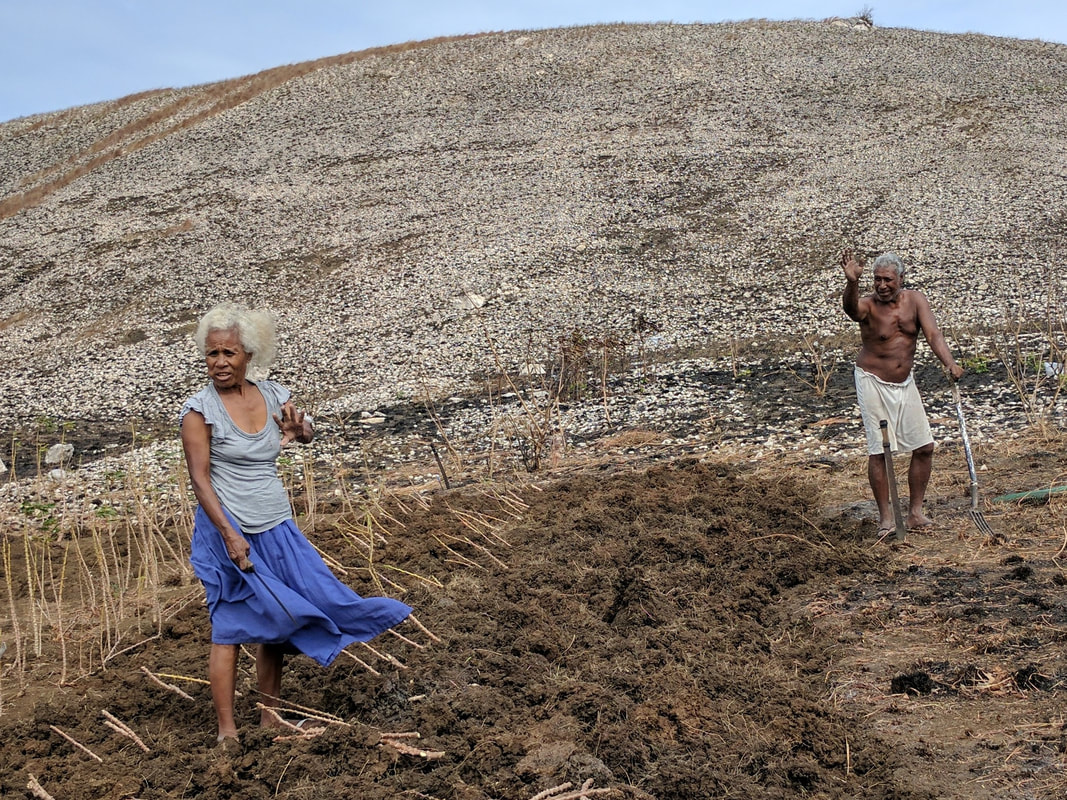
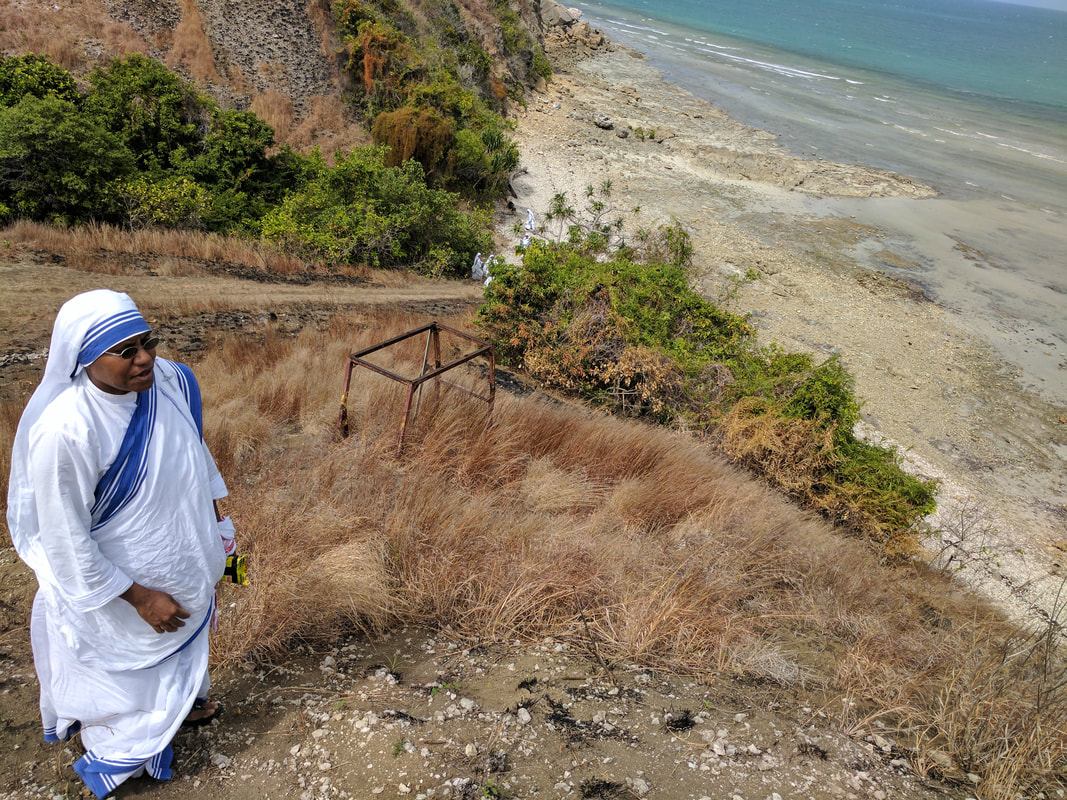


 RSS Feed
RSS Feed